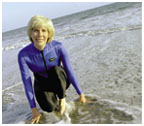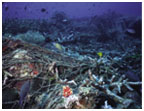|
Web Exclusives: Alumni Spotlight March 28, 2004:
Cynthia Lazaroff ’80 works to stop destruction of coral reefs Known as the rainforests of the sea, coral reefs are home to more than a quarter of all fish species on Earth and are the most biodiverse ecosystem in the ocean. They provide food for 10 percent of the Earth’s population and protect the shoreline from erosion. But due to sewage pollution, global warming, and illegal fishing practices, including overfishing and the bombing of reefs to bring fish to the surface, coral reefs around the world are dying. An estimated 10 percent of coral reefs have already disappeared, and an estimated 58 percent of all coral reefs are at risk today. If nothing were done, they could be eliminated from much of the planet by the beginning of the next century. About four years ago, when Cynthia Lazaroff ’80, a stay-at-home mom at the time, first learned about the plight of the world’s coral reefs and the vital role they play in the life cycle of marine life at a lecture by Abigail Alling, the president of the Planetary Coral Reef Foundation, she “was stunned,” says Lazaroff. She recently had been snorkeling with her then two-year-old daughter, MacKenzie, on a damaged reef in Antigua, and she asked Alling how she could help. Within a few weeks, Lazaroff became executive vice president of the Santa Fe-based Planetary Coral Reef Foundation (www.pcrf.org) and opened up its West Coast office in her Pacific Palisades, California, home, overlooking Santa Monica Bay. Since then she has worked tirelessly to oversee an international campaign to preserve and protect coral reefs and to promote public awareness of coral reefs by, among other things, designing a curriculum for schoolchildren and exhibits for museums. The foundation also studies coral reefs from its traveling research vessel, RV Heraclitus. Lazaroff is working on a project that will provide the world’s first baseline map of living coral reefs. A team at M.I.T. is designing a sensor for a satellite, which will be launched in Russia by about 2010, that will map and monitor coral reefs over time, says Lazaroff. The sensor will act “like eyes and see through the curtains of air and water,” she explains. “The satellite will transmit data back to Earth, and the information will be disseminated over the Internet for people around the world to access.” Before turning her attention to coral reefs, Lazaroff, a politics major with a certificate in Russian studies at Princeton, spent more than 20 years as a Russian-American relations specialist, educator, filmmaker, and activist, and in 1983 founded the first U.S.-U.S.S.R. Youth Exchange Program. She says of her new role, “I love the sea, I love coral reefs,
and I can’t imagine leaving a world without reefs to my daughter.
One of the great joys of my life is watching her delight and wonder
at the beauty of these sea creatures. I want her to have the chance
to do this with her children and her children’s children.”
By K.F.G.
Home Current
Issue
Web Exclusives: Headlines - PawPlus - Features Tooke's Take - Varsity Typewriter - Inky Dinky Do Raising Kate - On the Campus - Comparative Life - More... PAW Online Archives - Print Archives - Advertising Info - Reader Services Search the Site - Contact PAW Princeton University - Alumni Links - Alumni Council - Your Class Secretary |
||


